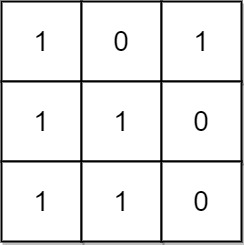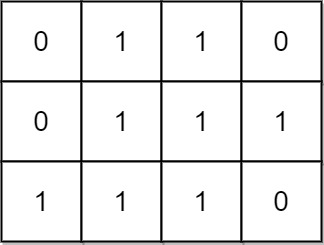Problem
Given an m x n binary matrix mat, **return the number of *submatrices* that have all ones**.
Example 1:

Input: mat = [[1,0,1],[1,1,0],[1,1,0]]
Output: 13
Explanation:
There are 6 rectangles of side 1x1.
There are 2 rectangles of side 1x2.
There are 3 rectangles of side 2x1.
There is 1 rectangle of side 2x2.
There is 1 rectangle of side 3x1.
Total number of rectangles = 6 + 2 + 3 + 1 + 1 = 13.
Example 2:

Input: mat = [[0,1,1,0],[0,1,1,1],[1,1,1,0]]
Output: 24
Explanation:
There are 8 rectangles of side 1x1.
There are 5 rectangles of side 1x2.
There are 2 rectangles of side 1x3.
There are 4 rectangles of side 2x1.
There are 2 rectangles of side 2x2.
There are 2 rectangles of side 3x1.
There is 1 rectangle of side 3x2.
Total number of rectangles = 8 + 5 + 2 + 4 + 2 + 2 + 1 = 24.
Constraints:
1 <= m, n <= 150mat[i][j]is either0or1.
Solution (Java)
class Solution {
public int numSubmat(int[][] mat) {
int[][] dp = new int[mat.length][mat[0].length];
for (int i = 0; i < mat.length; i++) {
int c = 0;
for (int j = mat[0].length - 1; j >= 0; j--) {
if (mat[i][j] == 1) {
c++;
} else {
c = 0;
}
dp[i][j] = c;
}
}
int ans = 0;
for (int i = 0; i < mat.length; i++) {
for (int j = 0; j < mat[0].length; j++) {
int x = Integer.MAX_VALUE;
for (int k = i; k < mat.length; k++) {
x = Math.min(x, dp[k][j]);
ans += x;
}
}
}
return ans;
}
}
Explain:
nope.
Complexity:
- Time complexity : O(n).
- Space complexity : O(n).